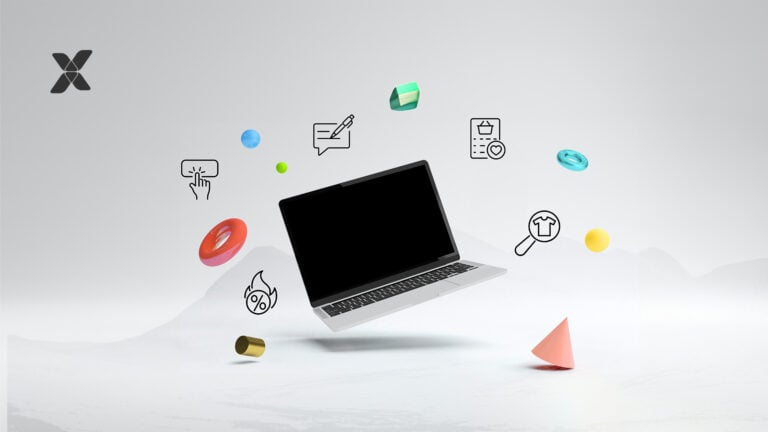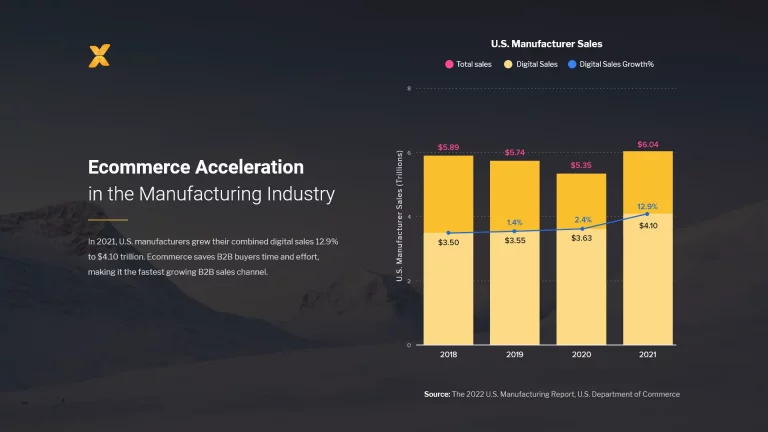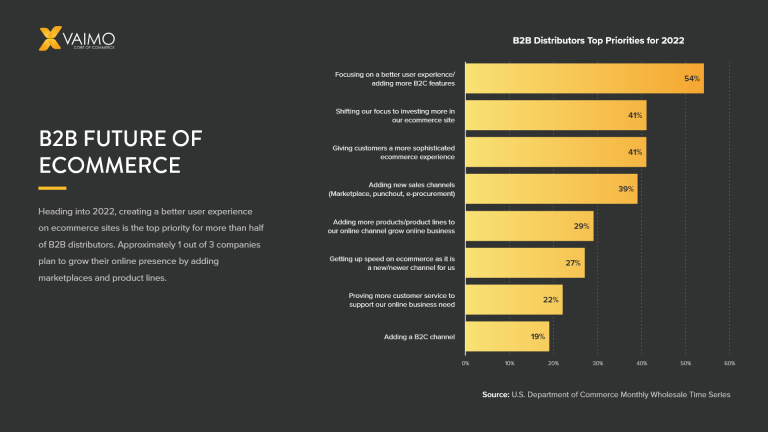The world of B2B wholesale is changing, and the B2B wholesale buying journey is quickly evolving. And as we’ve outlined in this article on Reimagining the B2B Buying Experience, digital B2B sales are here to stay. This means all players need to adapt to this new, digital B2B landscape, to meet the customers where they are: online.
As many traditional B2B businesses are moving their operations online, B2B wholesale ecommerce is also growing. In this article, we’ll look closer at the benefits of ecommerce for B2B wholesalers.
Related reading: Reimagining the B2B Buying Experience
What is B2B Wholesale Ecommerce?
Wholesale ecommerce is when one business uses an ecommerce model to sell goods in bulk and at a discount to another company to resell. Typically, a wholesaler is an intermediary between the manufacturer and the distributor or retailer. The most crucial advantage of wholesale is that it lowers the total costs of business. By selling products in bulk, you can take advantage of larger orders and reduce marketing spend. This generally leads to more profit per unit, and if you haven’t sold this way before, adding wholesale can be a way to add a new revenue channel to your sales mix.
The most common type of wholesale arrangement is one between producers and retailers. There are also wholesalers who sell to other wholesalers, and some wholesalers also market directly to consumers, such as Costco. But traditionally wholesaling means you’re selling to anyone but the end-user. For example, you might sell to:
- Physical stores
- Distributors and retailers
- Partners or reseller websites
- Schools and universities
- Tradeshows and conferences
Today, many retail ecommerce businesses are selling wholesale to drive growth without making a large capital investment or taking high risks. In fact, with the right B2B ecommerce platform, merchants who are considering going into wholesale can offer wholesale-specific pricing, automate most of the process from signup to checkout, and more.
Related reading: The B2B Ecommerce Marketplace Opportunity
The B2B Wholesale Buying Journey is Changing
Just as in other industries, digitalization is changing how B2B wholesale buyers research and buy products and services. B2B customers today are expecting to be able to purchase products digitally. Which makes sense considering wholesale customers, just like everyone else, are already accustomed to shopping online for personal items.
A recent study from McKinsey states that 70% of B2B decision-makers say they are open to making new, fully self-serve, or remote purchases in excess of $50,000. This highlights how the availability of information through digital channels has affected the way B2B buyers research and purchase products. This move toward an online B2B purchase journey limits the opportunities for wholesalers to influence buying decisions in person.
Imagine, for example, that you’re looking for a new dishwasher for your home. What will you do? Most probably, you will search online. You will look for reviews, features, and compare prices. And then, especially in these pandemic times, you will probably place an order online to have your new dishwasher delivered to your home.
This has become a common way to purchase items, and Covid has accelerated this evolution even more. Consumers conduct research and make comparisons online, and put a lot of stock into the online shopping experience. And the same is true for B2B wholesale customers.
Related reading: B2B Ecommerce Design & Development Trends in 2021
Millennial B2B Buyers Expect Digital Service
Part of this shift towards digital buying habits can be attributed to the rising number of millennials in the workplace. In 2020, almost half of B2B buyers are millennials, and they’re heavily involved in purchasing. According to a DemandGen Report, 44% of millennials considered themselves the primary decision maker and 33% were key influencers in the purchasing process. Catering to digital B2B buyers, especially millennials, is essential to succeeding in B2B wholesale ecommerce.
|
Want more advice on this topic? |
6 Benefits of Ecommerce for B2B Wholesalers
Ecommerce Saves Time and Resources
One of the most important benefits of selling wholesale online is ecommerce automation. You’ll spend less time managing orders over the phone and email and more time on the strategic needs of your business. Using an ecommerce platform to sell products is also a great way to automate time-consuming manual processes for wholesalers. With the right platform, tasks such as billing and inventory management are done with apps instead of by hand.
Related reading: Ecommerce Strategy 101: Choosing a Platform and Real KPI Metrics
Wholesale Ecommerce Speeds Up Your Growth
Selling wholesale online is perhaps the fastest way there is to speed up business growth. If you’re a manufacturer, selling in bulk can help raise product volume and lower cost-per-unit, which in turn helps your profit margin. Shipping in bulk to fewer customers can also lower fulfillment costs.
Ecommerce Makes Your Business Location-Independent
Wholesale ecommerce businesses aren’t limited by physical location. With a digital store, you can reach customers all around the globe via your website, social media, and marketplaces. This omnichannel experience means your customers have more opportunities to find you as they move between devices and channels.
Your Website Becomes a Data Goldmine
One of the most important benefits of online sales is the large amount of information it allows you to collect. When you have an ecommerce website, you get access to granular levels of customer data and insights. This data can be used to improve your marketing campaigns, product mix, pricing, and so much more. Combining this data with the feedback from your sales team and customer service representatives will give you a better understanding of your customers’ needs.
Related reading: Digital Experience Strategy – The Untapped Value of Customer Data in B2B Ecommerce
Wholesale Ecommerce Enables Personalization
Not only does ecommerce allow you to offer self-service portals to your customers, but you can also use personalization to enhance their experience. Serving your customers online means you can track their behavior and preferences to offer them the best possible service. For instance, custom price lists and catalogs can enable customers to log into your site and order the products they want without waiting for a salesperson to call them back.
Related reading: Ecommerce Personalization – Benefits, Tactics, and Best Practices
With Ecommerce, You Can Sell Through Mobile Devices
Wholesale B2B buyers are often on the go. They may not be spending their days in front of a desktop or laptop computer. Instead, many rely on mobile phones to find information about the products while they’re traveling or on a jobsite. Just like other consumers, B2B wholesale buyers want it to be easy and convenient to make the purchases they need.
Key Takeaways
In today’s rapidly changing ecommerce landscape, B2B companies need to shift their priorities and strategies to ensure B2B buyers get the same level of service and personalization they’ve grown accustomed to receiving in B2C purchasing experiences.
And as we’ve seen, there are numerous benefits for B2B wholesalers who move into an ecommerce business model. Those benefits include, but are not limited to:
- Ecommerce saves time and resources
- Wholesale ecommerce speeds up your growth
- Ecommerce makes your business location-independent
- Your website becomes a data goldmine
- Wholesale ecommerce enables personalization
- With ecommerce, you can sell through mobile devices
By setting up a flexible ecommerce platform that enables you to create consumer-like shopping experiences for your B2B customers while integrating with your existing systems for seamless order management, you will be able to drive business growth at a whole new level.
However, moving from traditional sales channels to an ecommerce business model can feel like a daunting task. When making this move, there are many things to keep in mind to avoid friction and get the most out of your investment. Finding an experienced partner will help you navigate the ins and outs of modern ecommerce.
How Vaimo Can Help
At Vaimo, we help B2B companies navigate the different aspects of digital transformation to create outstanding customer experiences that help drive growth.
If you’re looking for a partner to guide you through the digital transformation journey and help you understand how to make the most of the new ecommerce landscape, we’re here for you.
We’re happy to help you build and finetune your ecommerce strategy, implement technical changes, and improve the digital customer experience and buying journey. Get in touch with our team of experts to learn how we can help you take your ecommerce business to the next level.







